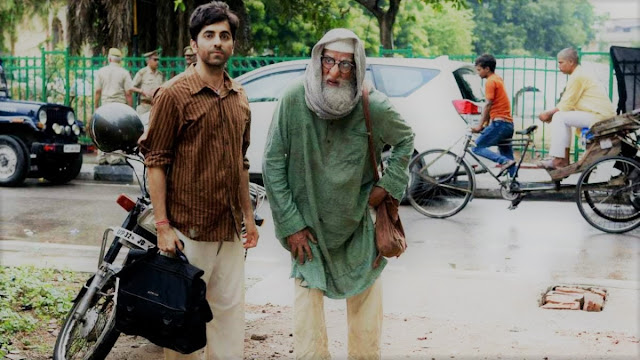Amazon Prime Video-Gulabo Sitabo Review
Greed, for the lack of a better word, is good, greed is right, greed works. You remember Gordon Gekko’s memorable lines from Wall Street? Gulabo Sitabo is the antidote to that. The film, directed by Shoojit Sircar and written by Juhi Chaturvedi, is a bittersweet study of greed and its consequences. But this isn’t a morality tale. Shoojit and Juhi don’t judge their characters. They simply present them with all their flaws and frailty.
The result is a film that is slyly funny, because human behavior is so often ridiculous, but also deeply melancholic. Gulabo Sitabo is infused with a lament for a more elegant, civilized world, which is now crushed by the crass and the corrupt. The name Gulabo Sitabo comes from traditional puppet art, in which the two characters quarrel incessantly.
Like Gulabo and Sitabo, Mirza and Baankey are always at loggerheads. Mirza is the landlord. Baankey, the tenant who pays only 30 rupees a month. They engage in a constant game of one-upmanship. Baankey threatens Mirza. Mirza steals his light bulbs and makes his younger sister spit out a piece of mango that she has eaten because it’s not hers. They are petty and a little pathetic. At the center of their battle is Fatima Mahal – a once-grand mansion in Lucknow that is now slowly crumbling – literally. When Baankey, in anger, kicks the bathroom wall, it crashes. This ‘Chandani haveli’ is a prominent character in the film. Shoojit and DOP Avik Mukhopadhyay showcase it like they would a fading star.
Also Read-
We see the arches and the grills, the vast rooms and long corridors, the courtyard and the walls with peeling plaster. The haveli, which is more than a century old is decrepit, but it has more dignity than most of the characters in the film. And yet these people lead such hardscrabble lives, that we understand their desperation and their constant jugaad to get ahead.
These people are on the margins of the middle class. A better life is in sight, but it’s not within reach. Baankey is frustrated by his dead-end job, his lack of education, his fraying relationship with his girlfriend, who tells him frankly: "Humein Pata nahi tha, ki aap itne gareeb gain".
Mirza has spent a lifetime waiting for his partner – the Begum who owns Fatima Mahal – to die so he can inherit it. He’s bent over, not just with age, but with his own servility. Together they are combustible. The film takes its time setting up this world, which is both contained and timeless. The first hour moves at a measured pace. In this, Gulabo Sitabo is more like October than Piku.
The humor is quieter. These characters aren’t necessarily likable, so you might feel a little fatigued in their company. The narrative also meanders, there's this whole bit about Mirza digging for treasure which just seems forced. But have patience, because slowly the emotional rhythms of the film take hold. And the plot jump-starts.
Juhi’s superpower is her ability to create keenly observed characters. They may not have much screen-time, but we know who these people are. Take Brijendra Kala’s Christopher Clarke – a Catholic lawyer in Lucknow, who insists that he’s special because he speaks English at home. His asides, in English of course, are superb. Vijay Raaz as the government official, who haughtily declares that he is archeology, is equally good.
And then there are the women in the film, the brilliant Begum, who casually asks Mirza if they got married or eloped. When he says married, she says, “Toh hum change kiske saath the?” It's amazing, I laughed out loud. There’s also Baankey’s sister Guido and his girlfriend Fauzia, both of whom have more smarts and sass than he does. Whatever ideas we might have about women in conservative environments, these women refuse to adhere to them.
Their unpredictability propels the story. One of the added pleasures of the film is the language – even the insults sound melodious, like choosi gutli sa chehra and deemak kahike. It’s lovely to listen to words like ulool jhulool, chironji and khandani paikhana, which incidentally means bathroom. The actors revel in the writing. Especially Amitabh Bachchan who with a prosthetic nose, white beard, and oversized glasses, leaves his Bachchan-ness behind him.
He makes Mirza cantankerous and stubborn, but also a shade tragic. I wondered, did anyone ever love this man? Ayushmann Khurrana doesn’t have props to play with, but he holds his own in front of the formidable Mr. Bachchan. He laces Baankey’s inherent misery and sourness with anger so that Baankey is always on the verge of exploding. In this film, he’s not the usual Ayushmann hero, grappling with a taboo topic and then impart in a life lesson.
It’s a tougher, more complex gig and he pulls it off, including a slight lisp. The stand-out is Farrukh Jaffar, who plays Begum – she’s over 85, but her sparkling personality dominates the frame. Gulabo Sitabo is likely to be an acquired taste.
As I watched, I wondered how this old-world film, might have played out in a theater. What would the warm blues and oranges of the haveli look like on a big screen? Would Shantanu Moitra’s nostalgic plaintive score, enrich the visuals more? I also worried that since streaming platforms don’t encourage commitment – if you get restless with one story, you just click on the next, how many people will actually see this film though? We’ll never know. But Gulabo Sitabo leaves you with a smile and an ache. And that’s a rare combination.











.jpg)

Comments